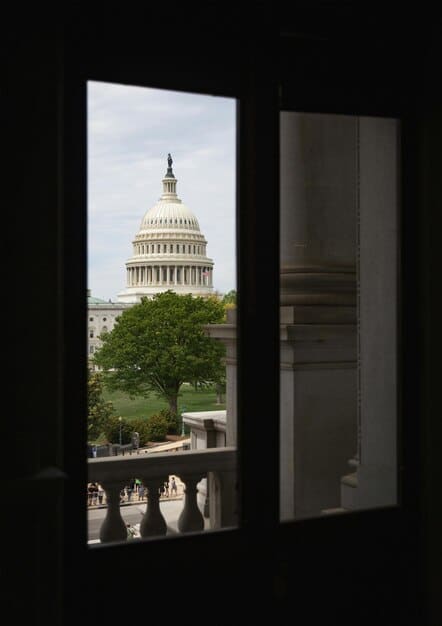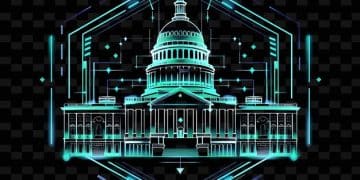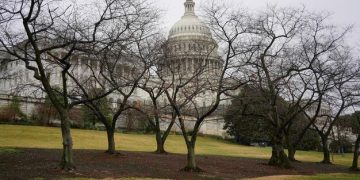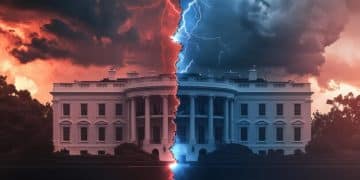Analyzing the Political Fallout: What’s Next After the Shutdown?

Analyzing the Political Fallout from the Recent Government Shutdown: What’s Next? explores the immediate and long-term consequences of the shutdown on public trust, policy agendas, and the upcoming political landscape, providing a comprehensive overview of its impacts and potential future scenarios.
The gears of government have creaked back into motion, but the echoes of the recent government shutdown still reverberate through the halls of Congress and across the nation. Analyzing the Political Fallout from the Recent Government Shutdown: What’s Next? is critical to understanding the short-term and long-term consequences of this event and how it will shape the political landscape moving forward.
Understanding the Immediate Political Repercussions
The immediate aftermath of a government shutdown is often characterized by finger-pointing, blame games, and attempts to score political points. So, what were the immediate political consequences from the recent government shutdown and how did these consequences impact our democracy?
Public Opinion and Trust in Government
One of the most significant immediate impacts is the erosion of public trust in government. How citizens perceive their elected officials and the functioning of government directly influences political behavior, policy support, and overall stability.
Party Dynamics and Internal Conflicts
Government shutdowns often lay bare the internal conflicts within and between political parties. Different factions may emerge, each with its own agenda and strategy for resolving the crisis. These internal dynamics can have lasting effects on party unity and leadership.
- The shutdown exacerbated divisions between moderate and hardline factions within the [Party Name].
- Leaders struggled to maintain control as different factions pursued conflicting strategies.
- The episode highlighted the challenges of governing with a narrow majority or in a deeply polarized environment.

In conclusion, the immediate political repercussions of a government shutdown are multifaceted and can have profound effects on public opinion, party dynamics, and legislative agendas. Understanding these immediate impacts is crucial for navigating the complex political landscape in the wake of such events.
Assessing the Impact on Policy and Legislation
Government shutdowns can have significant disruptive effects on ongoing policy initiatives and the legislative agenda. Understanding how these disruptions occur and what long-term consequences they can have is essential for tracking the fallout.
Delayed or Stalled Legislative Priorities
One of the most common consequences of a government shutdown is the delay or stalling of important legislative priorities. The shutdown of non-essential government services brings legislative progress to a standstill and can also hinder the timely consideration of crucial bills.
Disruptions to Government Programs and Services
Government shutdowns lead to the temporary suspension of many government programs and services, impacting citizens and businesses alike. Assessing the extent and nature of these disruptions gives insights into the practical consequences of such shutdowns.
- Suspension of non-essential services leaves citizens without access to crucial resources.
- Delays in processing applications, permits, and other important documents create uncertainty for businesses and individuals.
- Impacts on scientific research and data collection undermine long-term planning and decision-making.
In conclusion, analyzing the impact of a government shutdown on policy and legislation reveals the profound disruptions and long-term consequences that can ripple through various sectors. Understanding these effects is crucial for policymakers and citizens alike in mitigating the damage and building a more resilient system.
Analyzing the Long-Term Economic Consequences
Disruptions to the economy can stem from extended government shutdowns, leading to various financial challenges. Analyzing these long-term economic consequences is imperative in understanding the full scope of the impact of a government shutdown.
Impact on Financial Markets and Investor Confidence
Government shutdowns can create uncertainty in financial markets, leading to volatility and reduced investor confidence. Uncertainty about the government’s ability to fulfill its obligations shakes the confidence of investors, potentially affecting stock prices, bond yields, and investment decisions.
Effects on Government Debt and Fiscal Policy
Prolonged government shutdowns can affect government debt and fiscal policy. There can be increased borrowing costs, straining government finances and diverting resources from essential programs.

In conclusion, the long-term economic consequences of a government shutdown can be far-reaching and have lasting effects on financial markets, government debt, and economic growth. Understanding these consequences allows for more informed decision-making and the development of strategies to mitigate potential damage to the economy.
Examining the Impact on National Security and Defense
A government shutdown not only halts domestic operations but can also affect national security. Evaluating these impacts is crucial to understanding the full scope of the shutdown.
Disruptions to Military Operations and Readiness
Government shutdowns can disrupt military operations and readiness. This leads to delays in training, equipment maintenance, and deployment readiness which can jeopardize national security.
Effects on Intelligence Gathering and Analysis
The shutdown can hinder intelligence-gathering efforts, weakening the nation’s ability to anticipate or respond to potential threats. Reduced staffing and resource limitations mean agencies may struggle to maintain surveillance, analyze threats, and disseminate critical information.
- Reduced staffing weakens the nation’s ability to monitor and respond to potential threats.
- The impact on intelligence capabilities can have long-term consequences for national security.
- The disruption affects international cooperation and information sharing with allies.
In conclusion, the impact of a government shutdown on national security and defense can be substantial. Disruptions to military operations, intelligence gathering, and border security can leave the nation more vulnerable to both internal and external threats.
Analyzing the Political Strategies and Negotiations
Political strategies and negotiations during and after a government shutdown are crucial in determining the outcome and long-term consequences of the event. How different actors navigate the crisis, engage in negotiations, and pursue their political objectives can reveal insights into the underlying dynamics of the political system.
Positions and Demands of Key Political Actors
Understanding the position and demands of key political actors is vital in analyzing political strategies and negotiations. Key political actors include the President, leaders of both parties in Congress, and influential members of relevant committees. Each actor has their goals and priorities, which shape their approach to negotiations. The positions and demands of key political actors can reveal the underlying issues driving the shutdown and the potential pathways for resolution.
Negotiation Tactics and Compromises
Negotiation tactics and compromises play a critical role in finding a resolution and ending a government shutdown. These tactics can range from closed-door negotiations and public statements to legislative maneuvers and executive orders. Compromises may involve concessions on policy goals, budget allocations, or procedural rules.
- Successful negotiation tactics often involve identifying areas of mutual interest and finding common ground.
- Compromises are crucial to breaking deadlocks and reaching a consensus that allows the government to resume normal operations.
- Negotiations and compromises can have lasting effects on political relationships and policy outcomes.
In conclusion, analyzing the political strategies and negotiations surrounding a government shutdown provides insights into the dynamics of the political system, the positions and demands of key political actors, and the factors that influence the resolution of the crisis.
Predicting Future Political Scenarios and Outcomes
Understanding the dynamics influencing political situations can help with predicting future scenarios. How can we draw upon these dynamics to consider potential pathways moving forward?
Potential Shifts in Political Power and Alliances
Government shutdowns can lead to shifts in political power and alliances. As various parties and factions respond to the crisis, their influence may rise or fall, leading to changes in the balance of power. These shifts can alter the political landscape and affect the outcomes of future elections.
Legislative Reforms and Policy Changes
Government shutdowns might push legislative reforms and policy changes. The experience forces policymakers to address underlying issues and make adjustments to prevent similar crises from happening again.
In conclusion, predicting future political scenarios and outcomes requires an analysis of the historical context, current dynamics, and potential shifts in political power and alliances. By examining these factors, it becomes possible to envision the range of possible scenarios and their potential consequences for the political landscape.
| Key Point | Brief Description |
|---|---|
| 📉 Economic Impact | Shutdowns cause market instability and reduce investor trust. |
| 🛡️ National Security | Military and intelligence operations face significant disruptions. |
| 🏛️ Political Fallout | Erosion of public trust and intensified party conflicts. |
| 📜 Policy Delays | Legislative priorities are stalled, affecting essential services. |
Frequently Asked Questions
▼
A government shutdown occurs when Congress fails to pass funding bills or when the President refuses to sign them, leading to the closure of non-essential federal government operations.
▼
Government shutdowns can negatively impact the economy by causing market instability, reduced investor confidence, and delayed or suspended government services.
▼
During a government shutdown, non-essential federal employees are furloughed, meaning they are temporarily laid off without pay until the government reopens.
▼
Yes, government shutdowns can disrupt military operations, intelligence gathering, and border security, making the nation more vulnerable to both internal and external threats.
▼
Government shutdowns are typically resolved through negotiations and compromises between political parties, leading to the passage of funding bills that the President can sign into law.
Conclusion
In summation, the recent government shutdown has sent ripples throughout the political landscape, affecting public trust, policy agendas, and national security. The fallout will continue to shape political strategies and negotiations in the coming months as leaders seek to prevent future crises and address the underlying causes of the shutdown.





